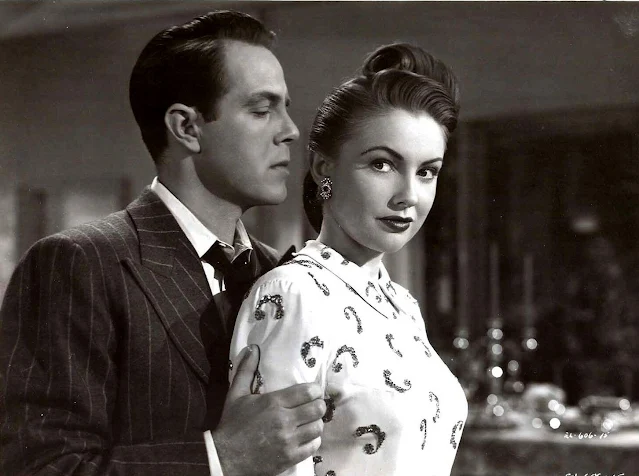 |
| Gary Cooper and Joan Leslie in Sergeant York |
Alvin C. York: Gary Cooper
Pastor Rosier Pile: Walter Brennan
Gracie Williams: Joan Leslie
Mother York: Margaret Wycherly
"Pusher" Ross: George Tobias
Major Buxton: Stanley Ridges
Ike Botkin: Ward Bond
Buck Lipscomb: Noah Beery Jr.
Rosie York: June Lockhart
George York: Dickie Moore
Zeke: Clem Bevans
Lem: Howard Da Silva
Director: Howard Hawks
Screenplay: Abem Finkel, Harry Chandlee, Howard Koch, John Huston
Based on a diary by Alvin C. York
edited by Tom Skeyhill
Cinematography: Sol Polito
Art direction: John Hughes
Film editing: William Holmes
Music: Max Steiner
Sheer Hollywood biopic hokum made watchable by Howard Hawks and Gary Cooper, along with a colorful supporting cast.
Sergeant York earned Hawks his one and only Oscar nomination for directing -- not
Bringing Up Baby (1938) or
Only Angels Have Wings (1939) or
His Girl Friday (1940) or
To Have and Have Not (1944) or
The Big Sleep (1946) or
Red River (1948) or
Rio Bravo (1959), more than two decades of the most entertaining movies anyone ever made. It was in fact Hawks's lack of the kind of high seriousness so often rewarded with Oscars that makes
Sergeant York still entertaining today, which is why he lost to John Ford for
How Green Was My Valley, a directing Oscar that by rights should have gone to Orson Welles for
Citizen Kane. It's fairly clear that Hawks doesn't take
Sergeant York entirely seriously, with its exteriors built on the soundstage, its well-scrubbed hillbillies, its cornpone hijinks and caricature religiosity, not to mention dialogue that sounds straight out of Al Capp's "Li'l Abner." But it also takes a Gary Cooper to deliver speeches like "I believe in the bible and I'm a-believin' that this here life we're a-livin' is something the good lord done give us and we got to be a-livin' it the best we can, and I'm a-figurin' that killing other folks ain't no part of what he was intendin' for us to be a-doin' here." Granted, Cooper had just turned 40 and was a good deal too old to play Alvin C. York, but his characteristic sly, shy self-effacement is essential to the role. The old story that York himself said that he wouldn't allow himself to be played on film by anyone else but Cooper sounds like the work of a Warner Bros. publicist, and one biographer has suggested that it was a hoax cooked up by producer Jesse L. Lasky to persuade Cooper to take the part, but
se non è vero, è ben trovato -- if it's not true, it ought to be.
Sergeant York cleaned up at the box office, especially when it got a second run after the attack on Pearl Harbor, and raked in 11 Oscar nominations, winning for Cooper and for film editing. Other nominees include Margaret Wycherly as Mother York -- a far cry from her killer mama in Raoul Walsh's
White Heat (1949) -- and Walter Brennan, with his false teeth in and his eyebrows darkened, as Pastor Pile, along with the screenwriters, cinematographer Sol Polito, the art direction, the sound, and Max Steiner's patriotic tune-quoting score. It can't be taken seriously today, but it can be enjoyed.



